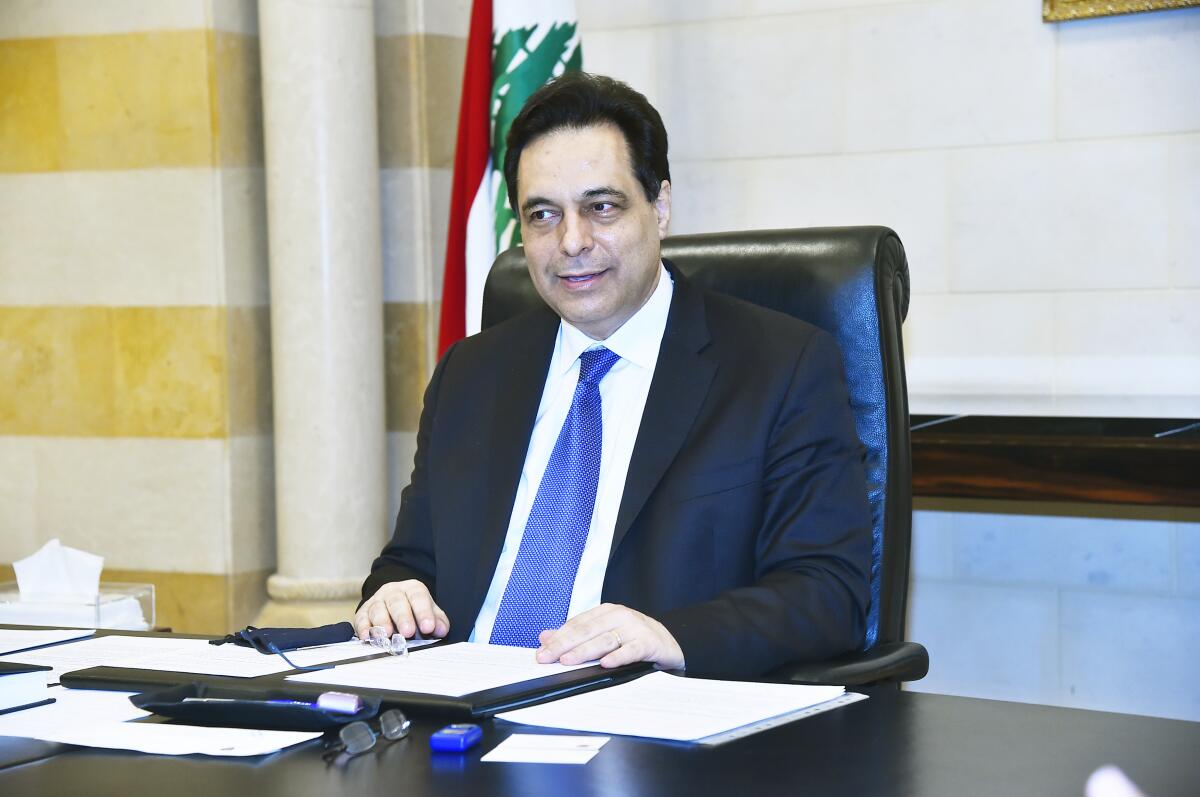Lebanese prime minister slams ‘diabolical’ move to charge him over blast

- Share via
BEIRUT — Lebanon’s caretaker prime minister said Tuesday he was shocked to learn he was being charged with negligence in the Aug. 4 port explosion, saying he did his utmost duty during his brief tenure, during which he learned about dangerous chemicals stored at the port.
In an interview with the Associated Press, Hassan Diab described being singled out and charged while others knew more, calling it “diabolical.” He insisted the investigating judge must go through parliament to question him further, now that he has been charged.
Lebanon’s prosecutor investigating last summer’s horrific explosion at the Beirut port filed charges against Diab and three former ministers earlier this month, accusing them of negligence that led to the death of hundreds of people.
The charges caused a political storm in Lebanon and Diab and other ministers refused to appear before the judge for questioning as defendants, calling the charges politically motivated and selective.
Two of the former ministers challenged the authority of Judge Fadi Sawwan, calling on him to be recused from the investigation and a new judge named. The challenge prompted a pause in the probe that has cast doubt on the fate of the investigation into the blast that killed more than 200 people and destroyed parts of Beirut.
“Questioning me is not an issue, he [the judge] is welcome to do it. But being charged is a whole different ball game,” Diab said.
The catastrophic explosion was caused by the ignition of a large stockpile of ammonium nitrate that — it later transpired — had been stored at the port for six years with the knowledge of top security officials and politicians who did nothing about it. They include senior security officials, the army command, the president and former prime ministers. The blast killed more than 200 people and wounded thousands, devastating large parts of the capital Beirut.
The challenge to Sawwan’s summoning is rooted in disparate interpretations over who has the authority to question ministers and heads of governments. According to Lebanon’s constitution, a separate council made up of judges and politicians and set up by parliament is entrusted with trying ministers and premiers for crimes of high treason, dereliction of duty and breach of the constitution — a body that has never been activated by parliament.
The move by Sawwan to exercise his discretion in accusing government officials came after he sent a letter and documents to parliament last month, informing lawmakers of serious suspicions relating to government officials and asking them to investigate. The lawmakers responded by saying that the material they received did not point to any professional wrongdoing.
On Tuesday, Diab — who voluntarily gave an affidavit to Sawwan in September — challenged him to present any evidence that incriminates him to parliament.
Diab said he first found out about the potentially dangerous material at the port from an advisor who had heard about it at an informal dinner June 3. He said that two hours later he received a different set of information, after which he requested a detailed file be presented to him within two days.
Diab said it took more than a month and a half to complete the file. The first letter he officially received was on July 22 and he immediately acted on it with the concerned authorities and scheduled a visit to the port. But he said he canceled after being told the stored chemicals were fertilizers. Ammonium nitrate is highly explosive when it decomposes but is predominantly used in agriculture as a high-nitrogen fertilizer.
“I respect the judicial system but I also respect the constitution, which is above all. And as such, if you want to charge me, send your files to the parliament and I can be charged there,” Diab said. He said he did not know why he was singled out among former prime ministers who spent more years in office, calling it “mind boggling” and “diabolical.”
“Somebody that has come and fought corruption from Day 1 ... somebody that is independent like me, with clean hands like me, I don’t know why they’re targeting me this way,” he said.
A former professor at the American University of Beirut, Diab was named prime minister a year ago after receiving the support of the powerful Hezbollah group and its allies. He resigned in the wake of the Aug. 4 blast but remains in his post in a caretaker capacity, as Lebanese officials have failed to agree on a new Cabinet.
Diab urged the judge to focus on why the ship carrying the ammonium nitrate was allowed entry into Lebanon in the first place and who allowed it to stay there for six years. He also said that an FBI investigation into the explosion found it was caused by 500 tons of ammonium nitrate.
“Where did the rest go?” he asked of a stockpile that was estimated to be 2,750 tons.
The FBI, which has aided Lebanon in the probe, has not made its findings public and the claims of missing nitrate could not be independently confirmed by AP.
Diab, in the interview, called on Lebanese politicians to urgently form a new government to put the breaks on the country’s economic and financial meltdown, which has been made worse by the explosion.
“They [politicians] are still behaving as if there’s no problem in the country.... We’re in a disaster. It doesn’t matter who takes which ministry, we have to all work together and forget political disputes,” he said.
Diab said he hopes that a new U.S. administration headed by President-elect Joe Biden will help “stir things up” and help move the country positively toward forming a government.
More to Read
Sign up for Essential California
The most important California stories and recommendations in your inbox every morning.
You may occasionally receive promotional content from the Los Angeles Times.










